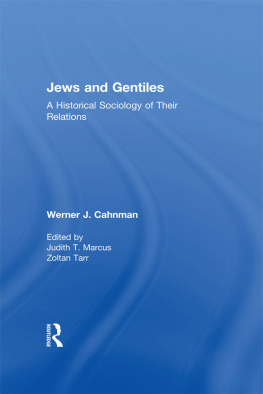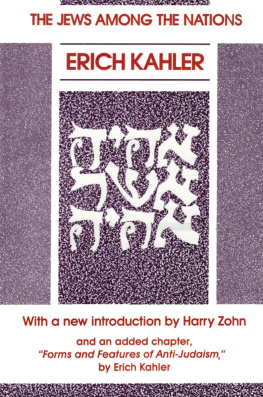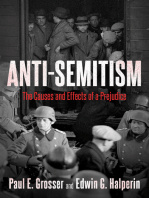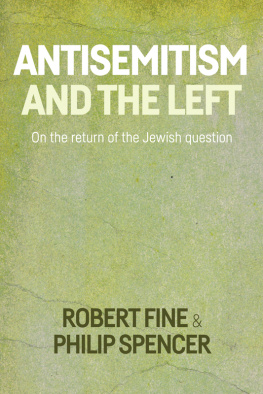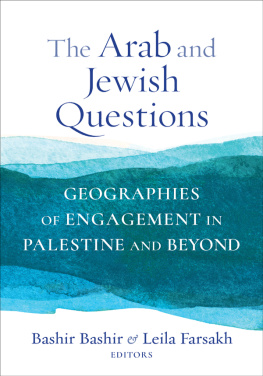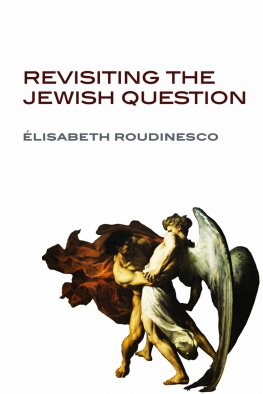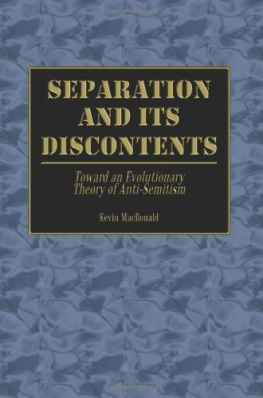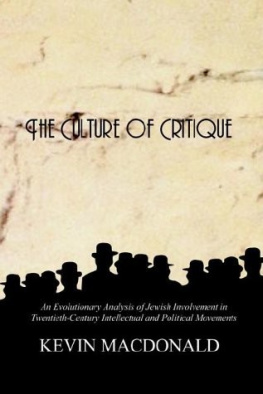Werner Jacob Cahnman - Jews & Gentiles: A Historical Sociology of Their Relations
Here you can read online Werner Jacob Cahnman - Jews & Gentiles: A Historical Sociology of Their Relations full text of the book (entire story) in english for free. Download pdf and epub, get meaning, cover and reviews about this ebook. year: 2003, publisher: Transaction Publishers, genre: Religion. Description of the work, (preface) as well as reviews are available. Best literature library LitArk.com created for fans of good reading and offers a wide selection of genres:
Romance novel
Science fiction
Adventure
Detective
Science
History
Home and family
Prose
Art
Politics
Computer
Non-fiction
Religion
Business
Children
Humor
Choose a favorite category and find really read worthwhile books. Enjoy immersion in the world of imagination, feel the emotions of the characters or learn something new for yourself, make an fascinating discovery.
- Book:Jews & Gentiles: A Historical Sociology of Their Relations
- Author:
- Publisher:Transaction Publishers
- Genre:
- Year:2003
- Rating:4 / 5
- Favourites:Add to favourites
- Your mark:
Jews & Gentiles: A Historical Sociology of Their Relations: summary, description and annotation
We offer to read an annotation, description, summary or preface (depends on what the author of the book "Jews & Gentiles: A Historical Sociology of Their Relations" wrote himself). If you haven't found the necessary information about the book — write in the comments, we will try to find it.
Studies of the Jewish experience among peoples with whom they live share some similarities with the usual histories of anti-Semitism, but also some differences. When the focus is on anti-Semitism, Jewish history appears as a record of unmitigated hostility against the Jewish people and of passivity on their part. However, as Werner J. Cahnman demonstrates in this posthumous volume, Jewish-Gentile relations are far more complex. There is a long history of mutual contacts, positive as well as antagonistic, even if conflict continues to require particular attention. Cahnmans approach, while following a historical sequence, is sociological in conception. From Roman antiquity through the Middle Ages, into the era of emancipation and the Holocaust, and finally to the present American and Israeli scene, there are basic similarities and various dissimilarities, all of which are described and analyzed. Cahnman tests the theses of classical sociology implicitly, yet unobtrusively. He traces the socio-economic basis of human relations, which Marx and others have emphasized, and considers Jews a marginal trading people in the Park-Becker sense. Simmel and Toennies, he shows, understood Jews as strangers and intermediaries. While Cahnman shows that Jews were not pariahs, as Max Weber thought, he finds a remarkable affinity to Webers Protestantism-capitalism argument in the tension of Jewish-Christian relations emerging from the bitter theological argument over usury. The primacy of Jewish-Gentile relations in all their complexity and variability is essential for the understanding of Jewish social and political history. This volume is a valuable contribution to that understanding. Cahnman one of the pioneers of historical sociology, surveys Jewish-Gentile relations from antiquity to the present, focusing on the role of Jews as outsiders who serve as mediators between worlds. - Choice Werner J. Cahnman (1902-1980) taught at many American universities, including Rutgers and the New School for Social Research. Judith T. Marcus is on the faculty of Kenyon College and is the author of Georg Lukacs and Thomas Mann: A Study in the Sociology of Literature. Zoltan Tarr has taught sociology and history at City College of CUNY, the New School for Social Research, and Rutgers University. He is the author of The Frankfurt School.
Werner Jacob Cahnman: author's other books
Who wrote Jews & Gentiles: A Historical Sociology of Their Relations? Find out the surname, the name of the author of the book and a list of all author's works by series.

